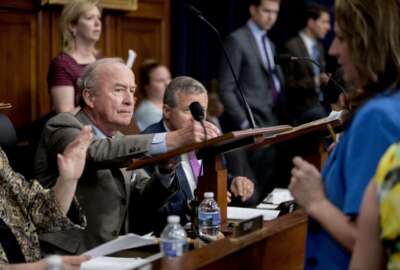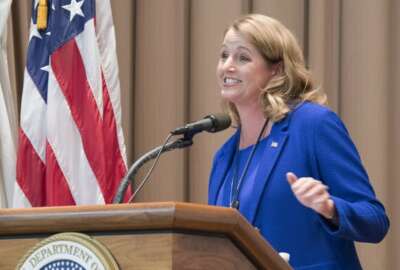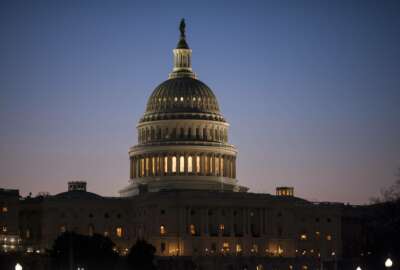

The Senate Appropriations Subcommittee has concerns about the amount of and specific information OMB is providing about the Technology Modernization Fund.
Best listening experience is on Chrome, Firefox or Safari. Subscribe to Federal Drive’s daily audio interviews on Apple Podcasts or PodcastOne.
 If the House Appropriations Committee decision to increase the IT modernization fund to $150 million was a vote of confidence to the Office of Management and Budget, then the Senate committee’s decision to zero out the fund in fiscal 2019 would be considered by some a vote of skepticism.
If the House Appropriations Committee decision to increase the IT modernization fund to $150 million was a vote of confidence to the Office of Management and Budget, then the Senate committee’s decision to zero out the fund in fiscal 2019 would be considered by some a vote of skepticism.
Before questioning the spirit and intent behind the Modernizing Government Technology Act or claim lawmakers already lost interest in the law, consider this: Maybe the Senate is teaching the new administration a lesson of sorts?
One of the challenges of bringing in executives without previous government experience is their inability to fully grasp the importance of communication with Congress. We have seen this with the Bush administration e-government initiatives. There is a popular story about an Interior Department official upset with the geospatial one-stop project going to “friends” on Capitol Hill to put a rider in the Interior spending bill to that would prohibit the agency from supporting the presidential initiative. What’s funny is that person is back in government, so hopefully they like the Technology Modernization Fund (TMF).
Under the Obama administration, Office of Management and Budget officials all but shut down the discussion about the Federal IT Acquisition Reform Act (FITARA) at one point, forcing one congressional staffer to almost publicly engage a key member of the administration in a debate about the bill.
And now, the Trump administration is starting to learn this sometimes hard lesson. No matter how often or much you think you have communicated with lawmakers and, more importantly, their staff, it was not enough.
Over the years, several former OMBers from the Bush administration have told me among their biggest mistakes was not working more with Congress.
So let’s go back to the TMF. Senate appropriators said in the bill’s report, “As the TMF reviews the remaining proposals, the committee encourages [the General Services Administration] and OMB to provide additional transparency surrounding agency proposals at each stage of the selection process, including projects submitted for consideration and those selected to receive funding. The committee will continue to monitor the proposal process and work with GSA and OMB to establish metrics for determining program and project success.”
Translation: You aren’t communicating enough and until we understand more, you are not getting more money.
Mike Hettinger, a former Hill staff member and now managing principal of Hettinger Strategy Group, said it’s clear there is some gaming going on.
“If I was OMB and GSA and I have a new program that appropriators were somewhat skeptical about at the beginning and played a big role in revamping it, I’d go overboard this year and give them everything they want to know,” he said. “I’d brief them every few weeks, letting them know how funding is being let out and keep them in the loop. My feeling is that didn’t occur and that is why OMB is seeing some push back.”
Sen. James Lankford (R-Okla.), chairman of the Appropriations Subcommittee on Financial Services and General Government, highlighted the need for more communication about the TMF process in an email to Federal News Radio.
“I am concerned about the lack of transparency with the allocation of the awards, and who is submitting proposals and why certain projects and agencies were or were not selected,” he said. “In the coming weeks, I hope to explore possible solutions to this lack of transparency.”
Hettinger said agencies and supporters of the TMF shouldn’t see this as bad news or even similar to what happened to the E-Government Fund that Congress insufficiently funded for years.
“Is money at risk? I don’t think so as long as OMB and GSA and the hill can work together. I think they will get the $150 million in funding,” he said. “I think this reiterates how important IT modernization is, and Congress is making sure they get the information they need. It also reiterates how important it is, especially for the sponsors of the MGT Act Sens. Jerry Moran and Tom Udall, for it to be successful. This back and forth with OMB and GSA is part of that.”
Sen. Jerry Moran (R-Kan.) said on June 21 during the subcommittee’s discussion about the spending bill that he was alarmed by the decision to remove all funding for TMF, but still is confident lawmakers will restore the funding.
“What I have learned and what I accept as important is there is good government that’s necessary as we pursue good government and that means that we need more information and that substantive and necessary oversight is currently lacking,” he said. “And we were able to work with the subcommittee to formulate a meaningful, in my view, amendment to require the GSA to provide specific information on how these dollars are being spent and I want to thank the subcommittee as well as you, Mr. Chairman, for working with us to accomplish that. It outlines what we need from the GSA, and my hope is that the GSA, even though this legislation with this language will not be law by the time we get to conference.”
He added the subcommittee’s message is intended to get the attention of OMB and GSA to provide the information the committee needs for oversight.
It’s not just the Senate that wants more communication. While the House committee approved $150 million for 2019 for the Technology Modernization Fund, lawmakers added more specifics about their expectations.
OMB has held on to information about the TMF like it was state secrets. OMB Director Mick Mulvaney told lawmakers how many proposals the TMF board received, but didn’t say from which agencies they came from. Other OMB and agency officials were tightlipped publicly and privately about which agencies submitted proposals, for what types of projects and really anything about the process before OMB announced the awards.
Maybe OMB was concerned that if they told the hill, it would leak out—invariably it would. But the questions then are: Who cares if the information is leaked? What is the harm? In fact, it may help the program.
And maybe OMB wouldn’t be in a position today to have to so aggressively promote and encourage agencies to submit more proposals for the remaining $55 million in the fund for 2018?
The message from Congress is clear: Federal CIO Suzette Kent, GSA Administrator Emily Murphy, a former Hill staff member, and GSA Federal Acquisition Service Commission Alan Thomas have the summer not only to give lawmakers the information they want, but to re-establish a regular cadence of updates about TMF.
If one thing has always been evident with any administration technology initiative over the years, it’s that OMB has done a good job managing down to agencies and across to vendors. But rarely has the e-government office figured out that managing up to Congress will make-or-break your initiatives. It’s time to figure this out if IT modernization is as critical as everyone says.
Copyright © 2025 Federal News Network. All rights reserved. This website is not intended for users located within the European Economic Area.
Jason Miller is executive editor of Federal News Network and directs news coverage on the people, policy and programs of the federal government.
Follow @jmillerWFED



